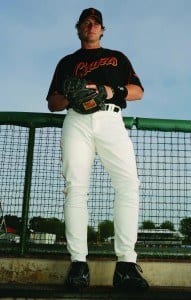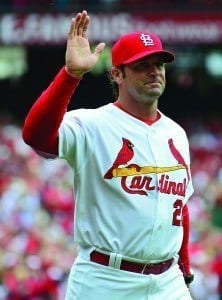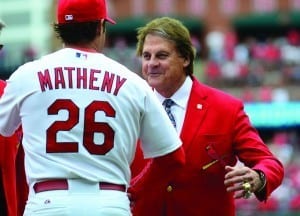It was early May and, although the Major League Baseball season was barely a month old, the St. Louis Cardinals were running roughshod over the rest of the league, jumping out to a 21-7 record as they flew into Pittsburgh to play the scrappy Pirates. The Cards took the first game but dropped the next two, falling to 22-9 on the season.
After the third game, a close 4-3 loss to the Bucs, Cardinals manager Mike Matheny took questions from the press.
“Mike, if someone would have told you that it would be May before you lost a series to another team, would you have been happy with that?” asked a reporter at the post-game press conference.
“No, I wouldn’t be,” responded Matheny flatly. “I’m never happy anytime we lose. We really don’t go into these games looking at trying to take a series. Winning two out of three or three out of four or whatever. We just try to win every game. Period. And that’s how you have to take it, game by game, and not who wins a series.”
And, with each passing game during the 2015 season, it became more and more apparent that it was going to be a great year for the Cardinals as they compiled the best record in baseball and the only team to reach 100 victories (100 wins, 62 losses). They fell short in the playoffs, though, against division rival, the Chicago Cubs (who finished three games behind the Cardinals with 97 wins and had the third best record in baseball behind the Pirates, who had 98 wins).
 After the 2011 season, when long-time manager Tony La Russa retired, many in Cardinal Nation were concerned that a manager of La Russa’s caliber could not be replaced so easily. After all, La Russa had proven himself to be one of the game’s greatest tacticians and few doubted that he was on his way to Cooperstown.
After the 2011 season, when long-time manager Tony La Russa retired, many in Cardinal Nation were concerned that a manager of La Russa’s caliber could not be replaced so easily. After all, La Russa had proven himself to be one of the game’s greatest tacticians and few doubted that he was on his way to Cooperstown.
But, at the beginning of 2012, a new face was in the Cardinals’ manager’s office, and while it might not have been familiar to many casual baseball fans, it was a face the Cardinals knew and trusted.
“When I took this job I made a promise to myself that I wasn’t going to try to be like Tony La Russa or anyone else and be true to who I was as a person and as a manager,” Matheny said. “And I also wanted to be true to what I think this organization wants me to do and not try to fill someone else’s shoes. I just try to go out and do my job without worrying about expectations from the outside and, instead, worry about the expectations that I put on myself.”
So far, the formula has proven to be successful.
The former major league catcher, who was hired by the Cardinals with no professional experience as a manager, has led St. Louis to at least 88 wins in each of his first four seasons at the helm and has also led the franchise to the National League Pennant in 2013.
He played for four teams during his major league career—Milwaukee (1994-1998), Toronto (1999), St. Louis (2000-2004) and San Francisco (2005-2006). Along the way, he won four Rawlings Gold Glove Awards and established major league records among catchers for consecutive games played without committing an error (252) and consecutive chances fielded without an error (1,565). He is also one of only three major league catchers with an errorless season of at least 100 games and set a Giants single-season, team record in 2005 for catcher’s fielding percentage at .999. He retired from playing because of persisting concussion symptoms and has since become an advocate for concussion prevention and improved catcher safety.
If there is anything striking about the quiet, no-nonsense Matheny, it is his sense of routine and discipline.
In Pittsburgh, when his Cardinals visited the Pirates in May, Matheny seemed to have a stricter pre-game regime than most of his players.
Get to the park, hit the weight room, meet with the media from 5 p.m. to 5:15 p.m. in the Cardinal dugout. Then throw batting practice from 5:15 p.m. to 5:30 p.m., watch the rest of BP from the field, get back to dugout, visit with a few coaches and players. Game starts.
Game ends. Hit the shower. Go back to hotel. Stir and repeat for 162 games.
Of course, that’s not the exact schedule, but you get the idea.
 “It’s been great playing for Mike,” said Cardinals pitcher John Lackey. “Since he was a good player himself and played a long time in the league, I think he understands the player’s perspective pretty well and is just an easy guy to play for. Catchers, for whatever reason, make very good managers. They seem to know both sides of the game and know how to handle pitchers. Mike’s preparation and his ability to lead from the bench is very good.
“It’s been great playing for Mike,” said Cardinals pitcher John Lackey. “Since he was a good player himself and played a long time in the league, I think he understands the player’s perspective pretty well and is just an easy guy to play for. Catchers, for whatever reason, make very good managers. They seem to know both sides of the game and know how to handle pitchers. Mike’s preparation and his ability to lead from the bench is very good.
“He’s a hard worker and takes the game very seriously. Most days, you can find him in the weight room with the rest of the team. While you’re working out, he’s in there getting after it with you and, as a player, that means a lot.”
Matheny also doesn’t seem to enjoy wasting a lot of time on things that don’t pertain to the game. In fact, he was quick to add that one of the biggest challenges he faces as a manager is dealing with all the technological distractions of the modern age.
“There is so much accessibility now with athletes because of all the technology that we have today and all that technology makes it difficult to manage,” he said. “There is a lot more pressure on players today because there’s just no way of getting away from the game and the fans. I think about these 21-year-old kids where every game is televised and everything that they do is televised on and off the field. There is always a camera in somebody’s hands and so the game of baseball has become not just what someone does on the field or how they make their living but who they are as a person and I think that, when that happens, it really becomes a dangerous thing.”
But Matheny was quick to add that all this new technology hasn’t been totally bad for the game.
“It’s still a great game and all this new technology has made it great because it has made it so accessible for so many more people and so much easier to follow,” he said. “But the negative side is that it has made it tougher on the people who actually play the game and that’s what I have to deal with as a manager.”
While all the new technology and strong influence of pop culture has made managing players at any level a challenge, Matheny is a strong Christian who says he got his priorities straight at an early age.
“I was fortunate in that I was raised in a strong Christian home where my parents surrounded us with great examples of what it should look like to live out the Christian life,” he said. “And, like a lot of kids, I found myself almost religious at a young age. But then I got really convicted at one point, and I will never forget that day. It was a revival at an Independent Baptist church and we had a guest preacher who came in and started pounding on his Bible and he really called us all out, even the people who had been there a long time and who were there twice every Sunday and on Wednesday night, and he called us out to who we were in our own faith and who Christ was to us.
 “I’ll never forget that. That was a night that really tugged on my heart and I really started asking some very serious questions. Fortunately, my parents knew to open up God’s Word and walk me through the Roman’s Road and brought me to the point of knowing that I’m a sinner and I needed forgiveness and asking Jesus to come into my heart. And that was the beginning of my true relationship with Christ.”
“I’ll never forget that. That was a night that really tugged on my heart and I really started asking some very serious questions. Fortunately, my parents knew to open up God’s Word and walk me through the Roman’s Road and brought me to the point of knowing that I’m a sinner and I needed forgiveness and asking Jesus to come into my heart. And that was the beginning of my true relationship with Christ.”
In college, his faith was tested in a world of academia where the Gospel of Christ is often considered foolishness to those on the outside. But Matheny said that, the more his professors or college classmates would try to disprove the validity of Christianity, the more his faith grew.
“First and foremost, I think a lot of times we are subject to what we are raised around and how we grew up, so naturally, growing up in a Christian home, that was where it first started with me,” he said. “But it was so real to me, too. I don’t consider myself a person who follows something without reason. I think and I make decisions for myself and even though I decided to make the decision to follow Christ at a young age, there was no doubt that this relationship and this spirit that I had within me was tangible and real to me. It goes beyond what human knowledge would start to defend. And then, obviously going off to college and having opportunities to actually defend my position on Christianity just seemed to deepen my faith and deepen my relationship with Christ.”
Matheny said that, when you think about it, his job is really no different than any other guy who is on the road a lot. And, no matter what profession you are in—whether you are a major league manager or a salesman traveling around the country or anything else—you still have to have people who will hold you accountable in your Christian walk.
“It’s just like with anybody who travels a lot,” Matheny said. “You’re away from your home, your family, your church, your wife and your kids. And that’s not necessarily where I want to be. I want to be with them as much as I can but, with the life I have chosen, I just can’t do that as much as I want to.
 “I believe that the fear of God is the beginning of all understanding and that’s a love-based fear. I know that His eyes are always on me, and I don’t want to disappoint anyone. I want to be the husband and father that God wants me to be, plus I want to be the manager that my players need me to be.”
“I believe that the fear of God is the beginning of all understanding and that’s a love-based fear. I know that His eyes are always on me, and I don’t want to disappoint anyone. I want to be the husband and father that God wants me to be, plus I want to be the manager that my players need me to be.”
Matheny added that he also feels the need to share the Gospel of Christ whenever he gets the opportunity.
“I’ve got several favorite Bible verses that I like, but I sign John 3:16 on my autograph because it wraps up the Gospel in a very succinct way,” he said. “I also like Proverbs 3:5-6 and Romans 1:16. Proverbs 3:5-6 says ‘Trust in the Lord with all your heart and lean not on your own understanding. In all thy ways acknowledge Him and He will direct your paths.’ And Romans 1:16 says ‘For I am not ashamed of the Gospel because it is the power of God that gives salvation to everyone who believes: first to the Jew and then to the Gentile.’
“I am not ashamed of the Gospel of Christ, and I never want to be ashamed of the great gift that I have been given called grace.”
By Jim Gibbs
Jim Gibbs is a freelance writer from Dallas. He can be reached at gibbsjim@gmail.com. This story was published in Sports Spectrum’s Winter 2016 print magazine.

